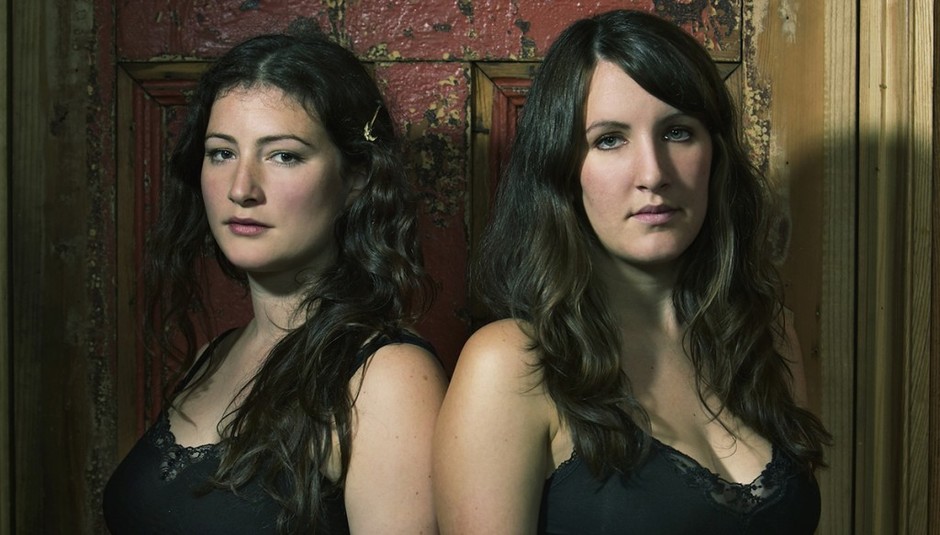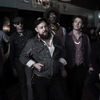Having started life a decade ago as Rachel Unthank & The Winterset before morphing into the band they are today, The Unthanks have firmly established themselves as one of folk's most progressive ensembles. In February, the band released arguably their most ambitious, experimental record to date in the shape of Mount The Air. Its eleven pieces represent a bold statement of intent that consistently push the boundaries, garnering an unprecedented wave of critical acclaim including an impressive 8/10 on this very site.
We're here at Cambridge Folk Festival with three of the band's core members - vocalists Rachel and Becky Unthank and multi-instrumentalist Adrian McNally. Earlier they played a breathtaking set on the main stage that will be talked about in years to come as one of the festival's finest.
DiS: You last played here in 2012 with the Brighouse And Rastrick Brass Band. What is it about the Cambridge Folk Festival that makes it so special?
Becky Unthank: We first played here as a duo in the Club Tent and we thought the audience were very generous in the way they supported us. Then we played here as The Winterset which was Rachel's band before The Unthanks, so I guess it's been quite pivotal at each stage of our career. When we came back with the Brighouse And Rastrick Brass Band three years ago it felt really special because a lot of that audience has seen us grow up and develop. And also from a spectator's point of view, I've come here and discovered so much new music over the years. I remember seeing Tinariwen here a few years ago. Their hypnotic music really blew me away and I didn't know who they were. It overpowered me and I remember thinking, "Wow, who are these guys?"
DiS: You also played on the Pyramid Stage at Glastonbury in June. How does a festival like that compare to this?
Becky Unthank: We like all the festivals we've played so far, whether it's a really small, homegrown one or something huge on the scale of Glastonbury. When we started making music we never dreamed we'd get the opportunity to even play there let alone appear on the Pyramid Stage so for that reason it was quite surreal.
Rachel Unthank: We've had a lot of different experiences in what's been a great summer for us so far. We've been playing somewhere different every weekend on stages of all shapes and sizes. Last weekend we played on the Other Voices Stage at Latitude, which was set up as a reconstructed church made of cardboard by a lake. I guess it's difficult to compare any of them with Glastonbury as it's such a huge beast of a festival. We're still on cloud nine about being given the opportunity to play there but at the end of the day, we're folkies and it means a lot to us what other folkies think. So in a way we're more nervous about playing here than Glastonbury.
Adrian McNally: Festivals of any kind are a challenge to us. Because we're a folk band with other influences beyond folk we're either at a rock festival having to prove ourselves or at a folk festival having to earn our stripes to a more traditional audience. We're always full of determination whatever the situation.
DiS: Your roots are set in the folk scene but having collaborated with the likes of Orbital's Paul Hartnell, Portishead's Adrian Uttley and Sting among others, do you see The Unthanks as bringing more contemporary elements to folk music?
Rachel Unthank: We really enjoy having new musical experiences ourselves. We're curious about new music to the point where if we feel we've connected with something, we've never made any secret of our desire to work with the artist that created it. In a selfish way it's really exciting.
Adrian McNally: Ultimately, our musical vocabulary is really broad and we're always looking for ways to extend it. We've no real desire to make folk music more contemporary. If we arrange something traditional we're only really looking for whatever beauty's inherent in that tune. We're looking to get to the heart of what was there all along and bring it out. In doing so we use our own musical vocabulary which as well as drawing from a lot of traditional folk music also draws from a more contemporary palette as well. You can only play music to please yourself and hope that other people get it as well.
DiS: Every record does sound totally different to its predecessor though, whichkind of sets The Unthanks apart from a lot of your contemporaries.
Adrian McNally: Absolutely. It's not an anti-folk thing to say we don't like being pigeonholed under any label. Because there's more media and places to access new music, a lot of that tends to get compartmentalized under a genre solely for the benefit of the public. So if you're someone that only wants to listen to one specific genre of music you might be put off from checking us out by the folk tag someone's placed on us. That's why we tend to focus on our broader musical vocabulary. We originate from the folk scene but I think there's a lot more elements to our music, which is not us trying to be disrespectful to the folk scene. If anything we want people to hear our music and listen to other folk-related artists as a result, but that's a difficult process.
DiS: Your latest album Mount The Air feels like a natural progression from any of your previous works, and is possibly your most experimental yet. The title track and 'Foundling' in particular sound quite complex and remind me of Sigur Ros in their arrangements. How did those songs develop?
Rachel Unthank: They all develop from Adrian's head!
Adrian McNally: It's just confidence really. I'm untrained. I write all the string and brass parts but I can't read or write music so I basically dictate to somebody that can. Our confidence and ability in what we do is growing to the point where we were daring enough to use some Miles Davis references in 'Mount The Air' amidst several classical ones. With 'Foundling', it was slightly different because when I think of a piece like that we have no right to go near it as musicians or players at all. It's in my imagination. That piece of music represents where we could go. But then it's another battle to work out how we make it go there. So we're on a constant learning journey, and once we've learned how to do something we move on. That's what artistry should always be about. A personal learning experience for the artist. The journey for the audience is witnessing that.
DiS: Are there any new artists you've been particularly impressed with recently?
Becky Unthank: We've just watched an incredible set by Rhiannon Giddens. She's awesome. Such a great singer and communicator.
Rachel Unthank: We saw The Moulettes recently and they were really good. Since then, Raevennan Husbandes has joined them and she's an amazing performer in her own right. It's given them a great new dynamic.
Adrian McNally: I'm really looking forward to playing at End Of The Road on the same stage and same night as Sufjan Stevens. He's our hero. Someone we all aspire to. Everyone feels a kinship with him in some way. He makes music that's far more accessible than his influences. His influences are very leftfield compared to his music, and that's something we're always trying to achieve. Commercialism is a compromise but being understood is the ultimate goal.
DiS: Was there a conscious plan for Mount The Air to turn out the way it did?
Rachel Unthank: Each song has its own journey. For 'Mount The Air' Becky did some research at Cecil Sharp House library in London and found a snippet that Adrian ended up using for the song.
Becky Unthank: At the time I didn't think he'd like it! I liked it but I assumed he'd think it was wet.
Adrian McNally: That's because it was in a major key. But I made it sound minor by adding relatively minor chords to it.
Becky Unthank: Which just goes to show you should always share these little things you pick up along the way. You never know what someone else might see in it. I definitely didn't see what Adrian saw in it.
Adrian McNally: We've never had a concrete direction for the band. We don't sit down before we make a record and go, "We want to sound like this." We basically let the songs lead us to where they ought to go in our imaginations. Then we have to deal with the practicalities of being many different bands at once.
DiS: Reviews for Mount The Air have been unanimously positive. Do you pay much attention to what the media are saying or writing about you?
Rachel Unthank: It's nice that people like it but I don't read too much into it to be honest. I'm more concerned with our own feelings and gut instincts when we're making a new record. I'm happy with the reviews but I don't think we'd be too bothered if the press didn't like it.
Adrian McNally: It's interesting because the more unpaid music journalism that exists should see a reduction in quality theoretically. The opportunities to make a living from it are diminishing so in theory a lot of talented people should be less attracted to it. Conversely with this record, we found the broadsheet reviews - as much as we got great star ratings - to be lazy and lacking in any insight whatsoever. Whereas all of the great writing came from a lot of the online reviews. That really struck me this time. I was totally surprised.
DiS: Are there any songs in place or ideas forming for the next record?
Becky Unthank: I've got a lot of research that's half researched, if that makes sense? Things I've gathered together I need to delve into. When I get a chance I'm going to delve into that fully.
Adrian McNally: Whenever we approach any record there's usually about 30 or 40 songs, so we've got a long way to go before we reach that. We've got a few ideas that need to become projects at some point. It's just so time consuming. We're playing with the Liverpool Philharmonic Orchestra next March, which will be the first time we've ever played with a full symphony orchestra. So there's every chance something might come from that.
DiS: Will there be a tour with the orchestra?
Adrian McNally: Probably not with the orchestra but we're on tour at the back end of this year, so I guess we'll mainly be focusing on that. We want to play more shows abroad as we've not done that for a while.
DiS: Finally, do you have any advice for new bands just starting out?
Adrian McNally: Yeah, don't do it!
Rachel Unthank: I wouldn't say don't do it because it's such an amazing privilege to be able to get up and perform on a stage. For people to stand there and listen and give you their time, it always overwhelms me. If you love playing or you love trying to communicate through songs then being in a band can be very worthwhile and rewarding.
For more information on The Unthanks including tour dates, visit their official website.






















